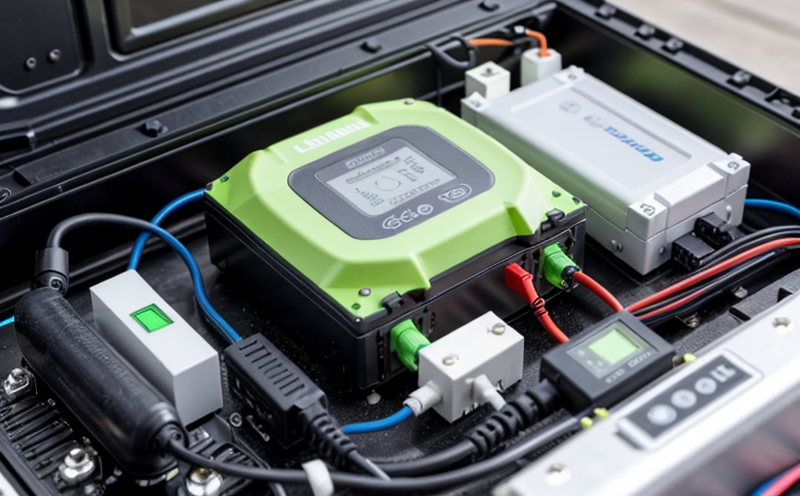IEC 63330 Lithium-Ion Battery Testing for UAV Applications
The IEC 63330 standard is specifically designed to ensure the safety and reliability of lithium-ion batteries used in unmanned aerial vehicle (UAV) applications. This comprehensive testing protocol addresses a range of critical aspects, including battery thermal management, mechanical integrity, and electrical performance under various conditions that UAVs encounter during operation.
The importance of this standard cannot be overstated, especially given the rapid growth of drones across sectors such as agriculture, surveillance, delivery services, and consumer electronics. The testing procedure covers a series of rigorous tests to evaluate battery safety in real-world scenarios. Compliance with IEC 63330 is not just about meeting regulatory requirements; it ensures that UAVs can operate reliably under extreme conditions without compromising the safety of the personnel involved.
One key aspect of this test involves evaluating the thermal stability of batteries, which is crucial given the high energy density of lithium-ion batteries. This includes tests to determine how a battery behaves in case of overcharging or short circuits. Another critical component is assessing mechanical durability through drop testing and vibration analysis. These tests simulate the harsh environments drones may face during operation.
Electrical performance under extreme conditions, such as low temperatures, high altitudes, and rapid changes in altitude, is also evaluated. This ensures that batteries can maintain their operational efficiency even when subjected to environmental stressors. The standard covers a wide array of tests including charge-discharge cycles, impedance measurement, and voltage monitoring.
Beyond the technical specifications, compliance with IEC 63330 also addresses safety considerations for end-users. This includes testing for flammability and ensuring that batteries meet fire safety standards. The goal is to prevent potential hazards in case of malfunctions or accidental overheating. Compliance also ensures that UAVs can be recharged safely, reducing the risk of fires or explosions.
The comprehensive nature of this standard makes it an essential requirement for manufacturers, especially those aiming to enter the global market. By adhering to IEC 63330, companies demonstrate their commitment to quality and safety, which is critical in a rapidly evolving industry where reliability is paramount.
Why It Matters
The significance of IEC 63330 Lithium-Ion Battery Testing for UAV Applications cannot be overstated. Compliance with this standard ensures that batteries used in drones are reliable, safe, and meet stringent quality standards. This is particularly important given the increasing use of drones across various industries.
- Enhanced Reliability: Ensures consistent performance of the battery under all operational conditions.
- Safety Assurance: Minimizes risks associated with battery failures, ensuring safer operations for UAVs.
- Regulatory Compliance: Helps manufacturers meet international safety and quality standards.
The standard is particularly relevant in the context of drones used in critical applications such as surveillance, search and rescue missions, and delivery services. These applications demand high reliability and safety, making compliance with IEC 63330 a necessity for any manufacturer aiming to meet the highest quality standards.
By adhering to this standard, manufacturers can ensure that their batteries are robust enough to handle extreme conditions such as cold temperatures and high altitudes. This not only enhances the performance of drones but also ensures user safety by minimizing risks associated with battery failures or malfunctions.
Industry Applications
The IEC 63330 Lithium-Ion Battery Testing for UAV Applications is particularly relevant in several industries where unmanned aerial vehicles play a crucial role. Agriculture, surveillance, and delivery services are some of the sectors that benefit significantly from drones.
In agriculture, drones equipped with cameras can be used to monitor crop health, map fields, and even apply fertilizers. Reliable batteries ensure that these missions can be completed without interruptions or risks. For surveillance applications, drones must operate continuously for extended periods under various environmental conditions. The safety and reliability of the battery are critical in ensuring uninterrupted operations.
In delivery services, drones are increasingly being used to deliver packages efficiently and cost-effectively. Reliability and safety are paramount in this context as any malfunction can lead to significant delays or even accidents. Compliance with IEC 63330 ensures that batteries used in these applications meet the highest quality standards.
These real-world applications highlight the importance of adhering to stringent testing protocols such as those outlined in IEC 63330. By ensuring that batteries are reliable and safe, manufacturers can enhance the performance of drones across various industries, thereby contributing to safer and more efficient operations.
Competitive Advantage and Market Impact
Compliance with IEC 63330 provides a significant competitive advantage for manufacturers in the UAV battery industry. This standard ensures that batteries meet stringent quality and safety standards, which is crucial given the increasing demand for reliable drones across various industries.
- Innovation: By adhering to this standard, companies can innovate with confidence, knowing they are meeting global safety and performance benchmarks.
- Market Access: Compliance opens doors to international markets where adherence to IEC standards is a prerequisite for entry.
- Customer Trust: Demonstrating compliance builds trust with customers who prioritize quality and safety in their purchasing decisions.
- Differentiation: Meeting this standard differentiates manufacturers from competitors, highlighting their commitment to excellence.
In a market where reliability and safety are increasingly paramount, adherence to IEC 63330 not only ensures compliance with international standards but also enhances the reputation of manufacturers. This can lead to increased customer trust, better market positioning, and ultimately, greater competitive advantage.
The standard's focus on real-world testing conditions ensures that batteries perform reliably under various environmental stresses, which is critical for drones operating in diverse environments. By meeting these stringent requirements, manufacturers not only meet regulatory demands but also set a benchmark for quality and safety, thereby impacting the market positively.





